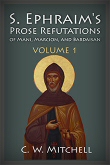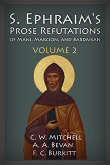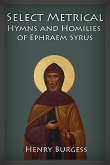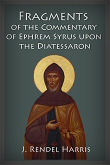The Works of St. Ephraim (4 vols.)
Digital Logos Edition
Overview
Known as the "Lyre of the Holy Ghost" and "Prophet of the Syrians," St. Ephraim the Syrian (also known as Ephrem and Ephraem) was a fourth-century theologian and hymnographer. A prolific writer, over 400 of his hymns are still in existence, as well as sermons, apologetic manuscripts, and his commentary on the Diatessaron. Ephraim's works provide a valuable window to fourth-century Christianity and the trials it faced.
The Works of St. Ephraim contains four volumes of his work: the two-volume Refutations of Mani, Marcion, and Bardaisan, Select Metrical Hymns and Homilies and Fragments of the Commentary of Ephrem Syrus upon the Diatessaron.
With the Logos Bible Software edition all Scripture passages in The Works of St. Ephraim (4 vols.) are tagged and appear on mouse-over. This makes these resources more powerful and easier to access than ever before for scholarly work or personal Bible study. With the advanced search features of Logos Bible Software, you can perform powerful searches by topic or Scripture reference—finding, for example, every mention of "resurrection" or "humility."
- Over 30 hymns from St. Ephraim the Syrian
- Contains both the English and Syriac translations of Refutations of Mani, Marcion, and Bardaisan
In the admonitory writings of Ephraem, everyone may justly admire how deeply his powers of influencing others penetrates, how much of sweetness proceeds from them, and how genius everywhere buds forth. It is not surprising that in his choice of language and of illustrations, his discourses incline to the customary style of homilies, and that he should employy a simplicity of utterance.
—Photius
- Title: The Works of St. Ephraim
- Volumes: 4
- Pages: 1,029

Volume one of S. Ephraim's Prose Refutations contains the English translation of St. Ephraim's five discourses against false teachings. In the first discourse, Ephraim directs his main attack against the teachings of Manichaeism, a major Gnostic religion that was challenging Christianity. The other four refutations are directed at Bardaisan, Mani, and Marcion. This volume also contains discourses 2–5 in the original Syriac.
Charles Wand Mitchell (1878–1917) was Hebrew Master at Merchant Taylors' School, London. He was ordained in 1907 and received his MA in 1912. In 1915, he served in World War I as a chaplain in the Canadian Army. It was on the Front, while bandaging a wounded soldier, where he was fatally wounded on May 3, 1917.

Volume two of S. Ephraim's Prose Refutations contains further refutations against Bardaisan, Mani, and Marcion and a discourse on virginity. This volume also contains each discourse in the original Syriac, with an introductory essay by F. C. Burkitt on St. Ephraim, the origin of the manuscripts, the theological systems of Bardaisan, Mani, and Marcion, and notes on the method of translation.
Charles Wand Mitchell (1878–1917) was Hebrew Master at Merchant Taylors' School, London. He was ordained in 1907 and received his MA in 1912. In 1915, he served in World War I as a chaplain in the Canadian Army. It was on the Front, while bandaging a wounded soldier, where he was fatally wounded.
Francis Crawford Burkitt (1864–1935) was Norris Professor of Divinity at the University of Cambridge from 1905 to 1934. His academic focus was the reception of the New Testament and textual criticism. He is known both for the critical stance he took on the notion of the Caesarean text type proposed by B. H. Streeter and also for his standard edition of Curetonianus, one of two known existing Old Syriac New Testament manuscripts.

Henry Burgess provides an in-depth introduction to the origin and development of Syrian metrical literature and on the life and poetry of Ephraem. Following the introduction, there are English translations of 35 hymns and nine metrical homilies. Burgess also provides a three-fold indice: of Syriac words, Scripture texts used, and an index of subjects.
Henry Burgess (1808–1886) was ordained a priest in 1851 and earned an LLD at Glasgow University the same year. He received his PhD from University of Göttingen in 1852. He authored numerous works, including a translation of Festal Letters of St. Athanasius, and was the editor for Clerical Journal and the Journal of Sacred Literature for over 10 years.

The Diatessaron is a prominent Gospel harmony created by Tatian, an early Christian apologist and monk. The Diatessaron was used as the standard Gospel text in the liturgy of at least some sections of the Syrian Church for possibly up to two centuries and was quoted or alluded to by Syrian writers. This volume contains the English translation of fragments from St. Ephraim's commentary on the Diatessaron, along with Harris' notes.
J. Rendel Harris (1852–1941) was educated at Clare College, Cambridge, before becoming Professor of New Testament Greek at Johns Hopkins University and at Haverford College. Harris then taught theology at Leiden University. He spent much of his career in the Near East collecting and translating rare manuscripts.
Ephraim the Syrian (c. 306–373) was a fourth-century theologian and hymnographer, and is a Doctor of the Church in the Catholic Church. Born in Nisibis, near Edessa, he was converted to Christianity by Bishop Jacob of Nisibis and appointed a teacher. He lived in Nisibis until 363, then went to Edessa for eight years to teach at the School of Edessa. He died from the plague that ailed the patients he was caring for.
Over 400 hymns composed by Ephraim still exist, hymns which he used to teach doctrine and to warn of heresy. His poetry garnered him the titles of "Lyre of the Holy Ghost" and "Prophet of the Syrians." Ephraim also wrote homilies and prose, but which far fewer manuscripts have survived.
Reviews
8 ratings

BKMitchell
1/28/2018
Michael Bremner
6/27/2014
Royal Hannosh
2/7/2014

Larry Proffitt (I
11/10/2013

G
8/3/2013
Patrick Novak
7/24/2013
John Vignol
7/24/2013

Milford Charles Murray
7/20/2013